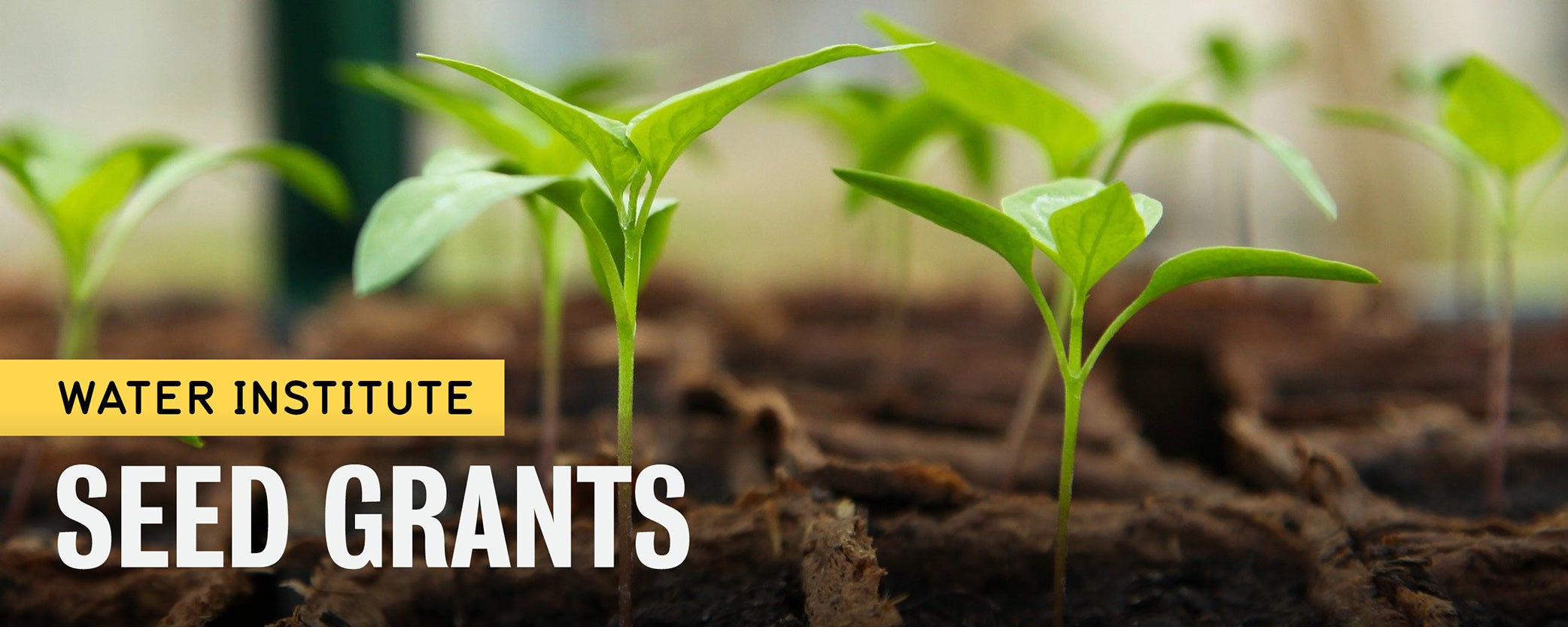The Water Institute is pleased to announce that four research teams have been awarded funding in its Spring 2020 seed grant competition. The Water Institute’s seed grant program was initiated in 2014 to stimulate interdisciplinary collaboration, international partnerships, and to encourage the development of research proposals that tackle increasingly complex global water issues.
This year’s seed grant projects include a diverse selection of inspiring and exciting initiatives:
Initiating the Canadian Tree-Talker Network
Primary
Applicant: Richard
Petrone, Geography
and
Environmental
Management.
Co-Applicants:
Myroslava
Khomik,
Geography
and
Environmental
Management,
Julie
Messier,
Biology,
Andrew
Trant,
School
of
Environment,
Resources
and
Sustainability,
Michael
Pisaric,
Brock
University,
Riccardo
Valentini,
University
of
Tuscia.
With the seed grant, the team will position Canada as a hub for North American participation in the Global Tree Talker (TT) Network which currently includes members from Austria, China, Germany, Italy, Russia, Serbia, Spain, and Switzerland. The goal of the Global TT Network is to utilize novel instrumentation to study communities of trees in different climatic environments and disturbance regimes to improve our understanding of forest ecosystems within the global hydrological cycle. The seed grant will be used to instrument a few test-pilot sites in Canada to test the applicability of the new instruments across Canada and recruit additional participants. In addition, workshops will be organized where potential Canadian and international network collaborators will develop a scientific strategy and external grant proposals.
Advanced datasets and methods for managing Ontario Conservation Authority watersheds
Primary
Applicant: Bryan
Tolson,
Civil
and
Environmental
Engineering.
Co-Applicants:
Nandita
Basu,
Civil
and
Environmental
Engineering/Earth
and
Environmental
Sciences,
Jason
Thistlethwaite,
School
of
Environment,
Enterprise
and
Development,
Daniel
Henstra,
Political
Science,
James
Craig,
Civil
and
Environmental
Engineering,
Juliane
Mai,
Civil
and
Environmental
Engineering.
The seed grant will be used to promote collaboration between Water Institute researchers, Conservation Authorities and provincial officials interested in surface water management. Specifically, a workshop will be organized to showcase novel University of Waterloo datasets, models and research expertise available for informing the state‐of-art practice and joint proposals.
Building an interdisciplinary collaborative network for exploring global CH4 emission dynamics
Primary
Applicant: Sherry
Schiff,
Earth
and
Environmental
Sciences.
Co-Applicants:
Tonya
DelSontro,
Earth
and
Environmental
Sciences,
Fereidoun
Rezanezhad,
Earth
and
Environmental
Sciences,
Laura
Hug,
Biology,
Maria
Strack,
Geography
and
Environmental
Management,
Josh
Neufeld,
Biology,
Monica
Emelko,
Civil
and
Environmental
Engineering.
As the concentration of atmospheric methane (CH4) increases yearly, and the rate of its accumulation accelerates, heightened international attention on this potent greenhouse gas underlines the importance of coordinating research capacity at the University of Waterloo. Although there is a critical mass of environmental researchers at Waterloo who work on CH4 dynamics in aquatic and terrestrial ecosystems, most progress has thus far been within individual independent research programs. The seed grant will be used to organize a networking workshop with the intention of consolidating the collaborative expertise of Water Institute researchers and developing a Waterloo-led network on CH4 dynamics that will formulate strategies and identify opportunities for capturing growing national and international funding.
3 through 6 via 5: Water security and gender‐based violence in sub-Saharan Africa
Primary
Applicant: Susan
J.
Elliott,
Geography
&
Environmental
Management.
Co-Applicants:
Jennifer
Liu,
Anthropology,
Jane
Keupfer,
Schlegel
Chair
in
Spirituality
&
Aging.
While the world is focused on achieving the UN Sustainable Development Goals by 2030, a large proportion of the world’s population remains without equitable access to safe water and adequate sanitation, with the greatest burdens related to women and girls. The seed grant will address a major gap in knowledge and policy, specifically the toll that gender-based violence plays in this water security issue. Through international partnerships and workshops, the project will define and investigate gender-based violence through developing research protocols, data collection tools to be used in new funding proposals focused on empowering women in the context of water security.
Thank you to everyone who submitted a proposal to this year’s competition and join us in congratulating the winners!
